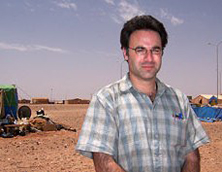
Impunity in Print: How Argentine Newspapers Benefited from the Dictatorship
The wind has changed in Argentina with the government taking on a number of initiatives to target corporate media in an attempt to democratize media ownership and access.

The wind has changed in Argentina with the government taking on a number of initiatives to target corporate media in an attempt to democratize media ownership and access.

With their 1994 battle cry, “Ya basta!” ("Enough already!") Mexico’s Zapatista uprising became the spearhead of two convergent movements: Mexico’s movement for indigenous rights and the international movement against corporate globalization.

Seven years ago, angered over the mainstream media’s flawed portrayal of the Iraq War, independent journalist Dahr Jamail took it upon himself to report from the front lines of the conflict.

Dispersing Power: Social Movements as Anti-State Forces by Raúl Zibechi offers an exciting account of why social movements in Bolivia are so resilient and powerful, making the publication of this book timely; it focuses on the most vibrant social movements that preceded the election of one of the most dynamic and intriguing presidents among the region’s new left.

Argentina approved a gay marriage law early this morning, making the country the first in Latin America where same-sex couples can wed. Same sex couples will now be granted the same rights, responsibilities and protections that married couples have. President Cristina Fernandez de Kirchner’s government supported the bill and defied the Catholic Church’s opposition to the law.

US intervention continues to haunt Latin America, a region overrun with brutal military dictatorships during the 1970’s and 80’s. Dictatorships coordinated torture, assassinations and disappearances under a US-backed program in Argentina, Brazil, Chile, Paraguay and Uruguay. The program, called Plan Condor, was a shared strategy in Latin America's Southern Region during the 1970s and 80s and had Washington involvement.
Copyright Toward Freedom 2019